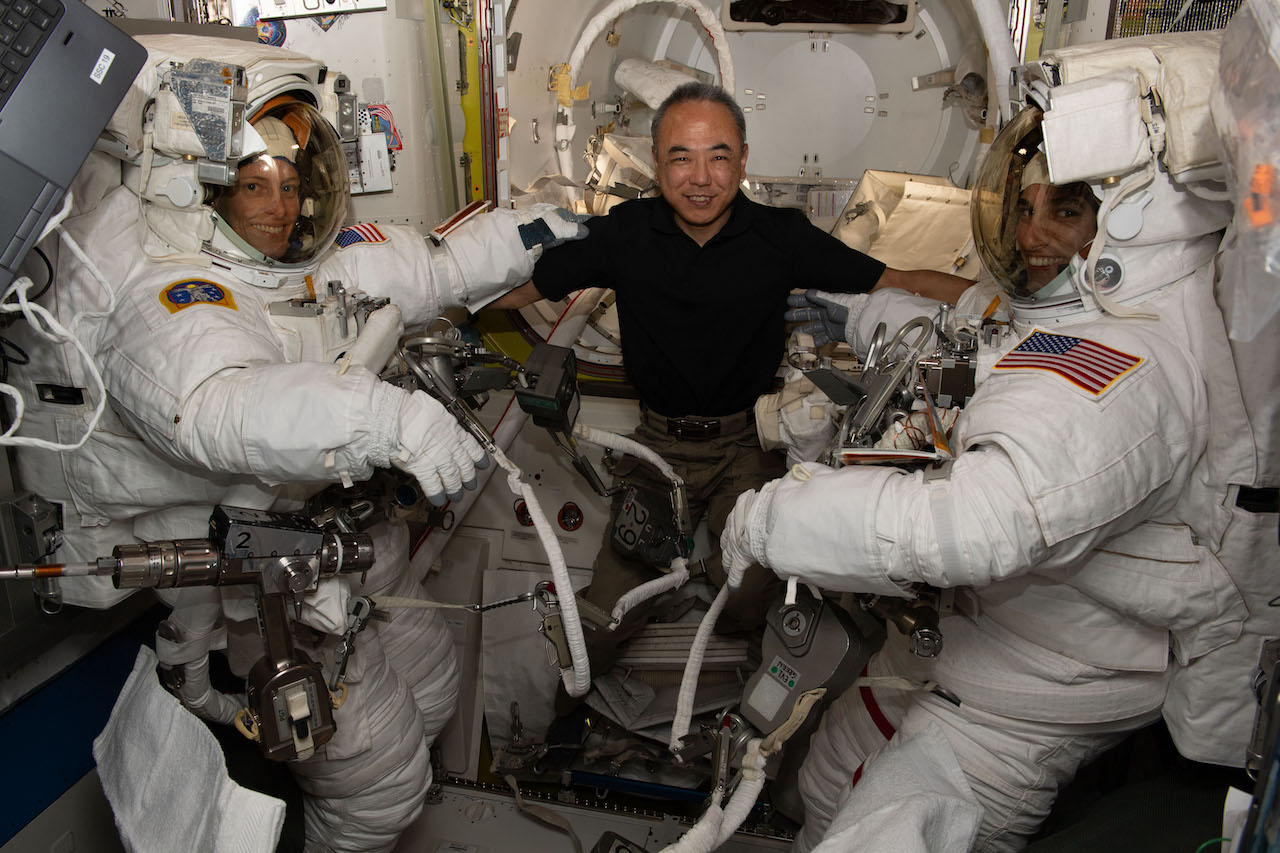by Christophe Bosquillon

Jasmin Moghbeli, Loral O’Hara, and Satoshi Furukawa are pictured inside the Quest airlock. Credit: JAXA/NASA
On November 16, 2023, ispace, inc. from Japan unveiled the final design of its micro rover, which will be transported to the surface of the Moon by its lunar lander as part of exploration activities during Mission 2. This mission 2, part of the HAKUTO-R lunar exploration program, will serve as the company’s second technological demonstration, with the objective of further validating the lander’s design and technology, and ispace’s business model, to provide reliable lunar transportation and data services.
Collaborations with new-to-space industries
The micro rover is being developed with co-funding from the Luxembourg Space Agency through a European Space Agency contract with the Luxembourg National Space Programme, LuxIMPULSE. The rover is scheduled to be loaded onto the lander in Japan in the summer of 2024. Mission 2 is expected to launch on a SpaceX Falcon 9 rocket no earlier than Winter 2024.
Epiroc, a mining and infrastructure industry partner, developed for ispace a shovel affixed to the micro rover for collecting lunar regolith : that deal is related to ispace’s collection of lunar regolith and its transfer of ownership to NASA. Chiyoda Corporation, Bandai Namco Research Institute, the University of Adelaide, and Kurita Water Industries Ltd. have joined the HAKUTO-R program as new supporting companies. Their contributions include knowledge sharing, development of special alloy plates, support for in-situ resource utilization, and technologies for water generation and recovery.
Rather than bragging, Japan quietly gets things done.
The Japanese space economy ecosystem increasingly engages with new-to-space industries and new partnerships in Asia and globally. This is reflected in the strategy of the SPACETIDE Foundation, a Tokyo-based nonprofit organization which recently joined the IAF. With a mission to create and orchestrate an ecosystem for the Asia-Pacific space industry, SPACETIDE drives a large and diverse community, connecting governments, large corporations, startups, professionals, and various terrestrial industries.
Japan, a pioneer in space technology and economic policy
Long before the ISS ever existed, Japan was already pioneering microgravity research in Earth orbit with the Cat Whisker Experiment for electronic materials crystal growth, it has been a leader in space-based solar power, and it had a head-start in wireless power transmission back in the 1980s. And by 2008, it had established a “Basic Plan for Space Policy” with the realisation of SBSP as a national goal further articulated between the Fiscal Years 2008 and 2015. The Japanese Ministry of Economy, Trade and Industry produced a roadmap for the implementation of SBSP by the 2050s, with the Japan Aerospace Exploration Agency (JAXA) taking the lead with an implementation map for ground and orbital demonstrations aiming at an orbital SBSP satellite system.
Japan developing space-based solar assets will eventually prove relevant for power generation on Earth, but also in orbit, and ultimately in cislunar space and on the Moon, although nuclear power will likely play an important role as well. And then there is orbital debris removal: as anticipated in June 2021 , thanks to Astroscale, Japan has taken the lead in developing a protocol for the management and removal of space debris. Because grabbing and removing an uncooperative orbital object has dual-use implications and can be weaponized, this clearly has international legal and security implications.
Japan’s strategy in and for space
Since it surrendered to Allied Forces in August 1945, Japan has had nearly 80 years to turn around. From a beaten-down and nuked Axis Power to an Allied-occupied country that was still allowed to retain its Imperial family, to a thriving industrial and economic power, to decades of stagflation, yet a stalwart US ally all the way. The cumulated efforts of several generations led to what Japan has achieved today, and it was worth it. As Japan currently experiences a renaissance in no small part due to a thriving space ecosystem, at home and in Asia, while further making its mark globally. You will seldom hear Japan boasting about “Strategic Autonomy”. Rather than bragging, Japan quietly gets things done. It all boils down to national security issues. After decades of imposed “pacifism” internalized by most of the population, the country has had to reckon that it lives in a dangerous neighborhood. Having long practiced “checkbook diplomacy” vis-à-vis with Asia and the rest of the world, and having made its mark in major global issues revolving around development aid, Japan has had to upgrade its game up to strategic diplomacy. The nation thrives to remain a leader in technology and industrial manufacturing. However, being still highly dependent on imported fossil fuels, as are South-Korea, China, India and the whole of Asia, it is developing alternative power generation technologies, from hydrogen to space-based solar power (and this is also why it needs space access).
Thus, while the Japanese space program has long been focused on the utilisation of space for peaceful economic purposes, that focus has shifted toward three critical drivers: national security, strategic diplomacy, and investment in space technologies, including and not limited to space-based solar power. And let’s not forget the defense sector: Japan is now aiming to enable (space) technology to ensure that Japan can defend its homeland against external aggression.
Conclusion
Japan is keen on the development of a space economy with a strong cislunar component. The intention is to turn the “Earth-orbital-cislunar-Moon neighborhood” into an integrated ecosystem. Japan intends to make sure this ecosystem remains safe and “peaceful” for all operating inside it. To achieve that, it is working hard on key technologies such as propulsion, landers, rovers, power generation, data, mining, lunar infrastructures, etc. But the country also engages new-to-space industries to get them to invest and contribute to that nascent cislunar economy and integrated ecosystem. Japan is also rising its profile in the global arena and will intensify its cooperation with allies. For the Asian nation, strategic and economic security in space and on Earth are intrinsically related. Because Japan is positioned to lead in both civilian and defence space value chains, it has become an indispensable space economy partner for many countries and regions, included, and not limited to, Europe.

Christophe Bosquillon has a diverse professional background, having operated globally with a focus on the Indo-Pacific region. His experiences in Japan, the Koreas, Taiwan, China, ASEAN, India, Russia, and Australia have given him a deep understanding of the multipolar realpolitik of our world under the Pax Americana. With a background in engineering, trade, and foreign direct investment in industries relevant to Space Resource Utilization (SRU), such as mining, transportation, energy, manufacturing, agrifood, environment, and digitalization, Chris is committed to developing SRU value chains that benefit the Earth. As an executive, owner, writer, and founder of Autonomous Space Futures Ltd, Chris has extensive experience in collaborative policy crafting and works to develop space business and governance models relevant to society. He is a member of NGOs that provide input to the United Nations Committee on the Peaceful Uses of Outer Space (UNCOPUOS) legal subcommittee Working Group on Space Resources. Chris contributes to regulatory clarity on appropriation, priority, sustainability, and sharing in a way that balances national interests with civil society inclusion, provided a transparent due process is followed. When advocating for access to technology and space for the Global South, Chris believes that emerging space powers’ participation in space markets must be commensurate with their interest and involvement in international space politics. He believes that their ability to develop sovereign domestic capabilities with spillover potential is also essential. Chris is keen on ‘Peace Through Strength’ diplomacy and deterrence-based security as enablers of secure space access. He supports sovereign cislunar space situational awareness as mandatory for freedom of circulation in the space domain and deconflicted cooperation on the Moon.





